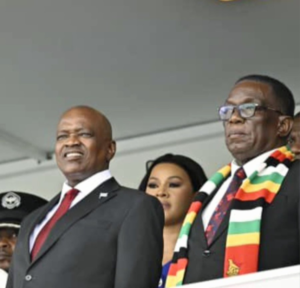NELSON CHAMISA ABANDONS CCC AMIDST INFILTRATION AND HIJACKING BY ZANU PF

In a stunning development that has sent shockwaves through Zimbabwe’s political landscape, Nelson Chamisa, the charismatic leader of the country’s main opposition party, the Citizens Coalition for Change (CCC), has announced his departure from the party. Chamisa’s decision comes after two fiercely contested and disputed presidential elections against President Emmerson Mnangagwa, marking a significant turning point in Zimbabwe’s opposition politics.
Chamisa, in a detailed statement, declared, “With immediate effect, I no longer have anything to do with CCC.” This proclamation signals the demise of the CCC, a party that was essentially synonymous with Chamisa’s leadership. The party’s future now hangs in the balance, echoing the fate of its predecessors, the MDC-T and MDC Alliance, which collapsed following Chamisa’s exit amid internal conflicts.
The core of the crisis, according to Chamisa, lies in the alleged criminal infiltration and hijacking of the CCC by the ruling Zanu PF party and its agents. He accused Zanu PF of “infiltrating, contaminating, bastardizing, and hijacking” the CCC through political chicanery, a strategy he asserts is part of the ruling party’s broader authoritarian repression and economic mismanagement tactics. Modern authoritarian regimes, Chamisa pointed out, have evolved more sophisticated methods of repressing opposition, a strategy he believes Zanu PF has successfully employed.
Chamisa’s critics, however, argue that the downfall of the CCC was inevitable due to its “strategic ambiguity.” They point to the lack of a constitution, organisational structures, office-bearers, and a formalized leadership system as fundamental weaknesses that made the party vulnerable to such a takeover. The critics also highlight the dangers of personality-centric politics, a prevalent feature in Zimbabwe’s political scene.
The crisis within CCC reached a boiling point following the actions of the self-imposed secretary-general, Sengezo Tshabangu. Taking advantage of the party’s amorphous structure, Tshabangu and his allies from Bulawayo claimed interim leadership and initiated a series of recalls of CCC’s MPs, senators, and councillors. This move, seen as a blatant act of democratic subversion, was supported by the executive, parliament, judiciary, and, allegedly, state security agents aligned with Zanu PF.
Chamisa’s departure leaves the party’s MPs, particularly those loyal to him, in a precarious position, vulnerable to further political maneuvers and potential recalls. This event has not only created a vacuum in the opposition’s political space but also raises concerns about Zimbabwe transitioning into a de facto one-party state, threatening the very essence of democracy in the country.
Reflecting on the situation, Chamisa emphasized that the original vision of CCC, centered around God and citizen-focused decision-making, had been severely compromised. He lamented the transformation of CCC into an extension of Zanu PF, driven by personal gain and political ambition, deviating from its founding principles and mandates.
Despite these challenges, Chamisa remains hopeful and committed to his role in public service. He stressed the importance of finding honest, accountable leaders and emphasized the need for fresh politics driven by genuine leaders who prioritize service over self-interest. Chamisa’s message to the people of Zimbabwe was clear: giving up is not an option, and the fight for true change and freedom continues.
As Chamisa steps away from the CCC, he leaves a legacy of resilience and tenacity in the face of political adversity. His departure marks a new chapter in Zimbabwe’s political narrative, one that calls for unity, integrity, and a renewed commitment to democratic values and practices. The path ahead is uncertain, but the quest for a “New Great Zimbabwe” remains undiminished.



